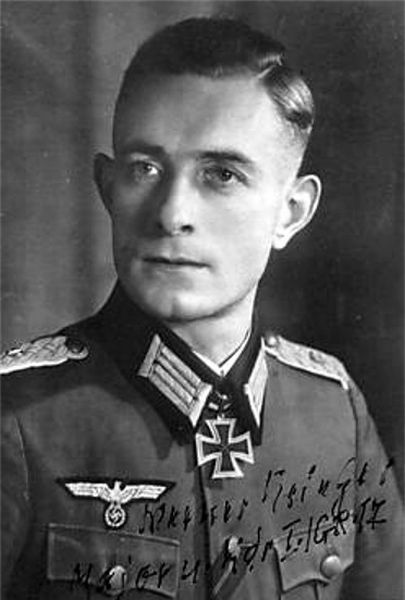Krieger, Werner
- Date of birth:
- June 24th, 1916 (Leipzig/Saxony, Germany)
- Date of death:
- August 19th, 2005 (Hannover/Lower Saxony, Germany)
- Nationality:
- German
Biography
Werner Krieger finally reached the rank of Oberstleutnant. After the Second World War he served with the Bundeswehr from 3rd September 1956 until 30th September 1964, finally reaching the rank of Brigadegeneral.
Do you have more information about this person? Inform us!
- Period:
- Second World War (1939-1945)
- Rank:
- Hauptmann (Captain)
- Unit:
- I. Bataillon, Grenadier-Regiment 17, 31. Infanterie-Division, Heer
- Awarded on:
- October 8th, 1943
- Period:
- Second World War (1939-1945)
- Rank:
- Major
- Unit:
- Kommandeur, I. Bataillon, Grenadier-Regiment 17, 31. Volksgrenadier-Division, Heer
- Awarded on:
- October 31st, 1944
“The Crossing over the Gauja Secured — The Knight’s Cross Action of Major Werner Krieger:
During the retreat battles of the German forces from Estonia a Battaillon commander in a Braunschweiger Grenadier regiment, Major Werner Krieger, has particularly excelled.
On the 25.09.1944, after he learned that a ford had been discovered at the Gauja river, he immediately set up a bridgehead to secure the crossing site with his Bataillon. He proofed this position against all enemy surprise attacks with anti-tank and heavy infantry weapons. It was not long however before Soviet tanks attempted to break through to the ford. Major Werner Krieger and his Grenadiers defended against this attack by far superior forces in heroic combat. By doing this he made it possible for all the other German units to pull back over the Gauja with all of their wounded. Furthermore, the self-sacrificing action of Krieger’s Bataillon ensured that much valuable materiel and numerous artillery pieces could also be brought over.
Even after the Soviets had penetrated into the bridgehead near the end of the river crossing, the brave officer held out long enough for those weapons that could not be saved to be blown up and thereby not fall into the hands of the Soviets. Only after this was done did he give the order for his Bataillon to retreat. He himself was the last to cross the river. In the process he was heavily wounded, however his men (who would do anything for their popular commander) pulled him out of the water and brought him to the main dressing station. His decisive act was recognized with the award of the Knight’s Cross.”
- Period:
- Second World War (1939-1945)
- Period:
- Second World War (1939-1945)
- Period:
- Second World War (1939-1945)
Sources
- Photo 1: Willi Schumacher
- Photo: Willi Schumacher collection
- - FELLGIEBEL, W.P., Elite of theThird Reich, Helion & Company Limited, Solihull, 2003.
- PATZWALL, K. & SCHERZER, V., Das Deutsche Kreuz 1941-1945, Band II, Verlag Klaus D. Patzwall, Norderstedt, 2001.
- SCHINDLER, MICHAEL G., Ritterkreuzträger aus Sachsen 1939-1945, libergraphix, 2013.
- Die Ordensträger der Deutschen Wehrmacht (CD), VMD-Verlag GmbH, Osnabrück, 2002
- das-ritterkreuz.de







